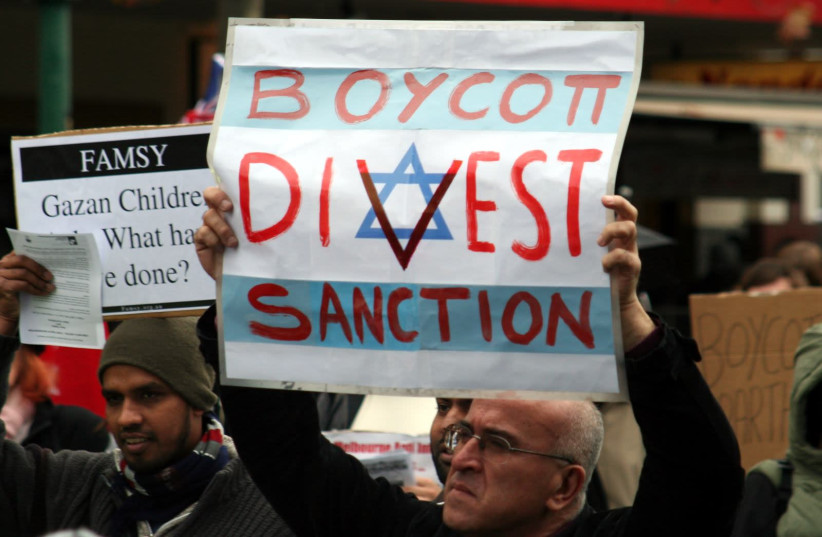The newly-launched Mapping Project, a conspiratorial website that singles out Jewish institutions in the Massachusetts area for dismantlement, has rattled American Jews due to its frightening resemblance to Nazi-era policies and the target it puts on their backs.
Equally disturbing was the lavish praise the project received from dozens of groups supportive of the movement to boycott, divest, and sanction Israel (BDS), including the movement’s official Boston affiliate, which shed the veneer of human rights in the process and demonstrated their bigotry for all to see.
Yet, in a strange turn of events, the project was criticized by the movement’s terror-linked leadership, known as the Boycott National Committee (BNC), in a transparent bid to protect its faux progressive image. The BNC’s criticism of the map – that it un-strategically provides the names and locations of Jewish institutions – is not one of substance, but of how it can damage the movement’s public image. Nevertheless, it caused a rupture throughout BDS, with numerous college-age activists excoriating the BNC and rallying in support of a map that effectively promotes violence.
This development should concern all Americans, especially since pro-BDS groups are active in most major American cities, including at institutions of higher education. And as repeated attacks at synagogues and Jewish institutions have shown us, singling out Jews has deadly consequences. In fact, antisemitic incidents across the US reached an all-time high in 2021, according to the Anti-Defamation League.

A franchise business
The BDS movement is a “franchise business” consisting of numerous local branches, with the BNC coordinating its activities from Ramallah. Established in 2007, the BNC’s primary member is the National and Islamic Forces in Palestine, itself comprised of five US-designated terrorist organizations, including Hamas and the Popular Front for the Liberation of Palestine (PFLP).
These organizations have been responsible for countless attacks against Jews and Americans abroad, including the murder of 17 Christian pilgrims from Puerto Rico in the 1972 Lod Airport Massacre, 17-year-old David Boim, who was shot and killed at a bus stop in 1996, and a 2001 suicide bombing at a Sbarro pizzeria in Jerusalem that took the lives of two Americans, among a total of 15 people murdered.
Considering the BNC’s violent, terroristic makeup, why did it come out in opposition to the Mapping Project’s targeting of Jews? Well, in reality, it didn’t. In a leaked letter sent to its Boston affiliate instructing them to rescind their endorsement of the project, the BNC doubles down on its support for the Palestinian right to resistance “by all means, including armed resistance” – an oft-used reference for terrorism.
WHAT THE BNC truly “opposes” about the Mapping Project is that it unintentionally reveals to the public that the terminology exploited by BDS for years to maintain the guise of progressivism is merely a facade to woo young Americans. By using this laser-focused messaging, BDS was able to package its antisemitism in a palatable way to this influential sector of society. Yet, the BNC realized that the Mapping Project, which uses the same jargon but targets Jews in an uncommonly blunt manner, exposes this clever manipulation.
Contrary to the BNC’s more strategic-minded approach, 21 BDS-supporting organizations have lauded the Mapping Project, including the Palestinian Youth Movement, Students for Justice in Palestine (SJP) and Samidoun (an alleged proxy of the PFLP), all of which are active throughout the US and college campuses. Many online BDS activists have likewise voiced dismay at the BNC’s cowardly and compromising statement, while others slammed it as morally disgraceful and for siding with Zionist organizations.
In a particularly noteworthy attack, a California-based group called JISR Collective, which has glorified the PFLP and the Iranian regime, published an 8,000-word viral blog post condemning the BNC, replete with graphics and breakdowns of its supposed repression against BDS activists.
This type of ideological infighting, wherein institutionalized groups like the BNC act as gatekeepers for a broader movement, often leads to widespread fractures like the one playing out before our eyes. Clearly, the BDS leadership – sitting thousands of miles away – is out of touch with its activist class on the ground, at least on a tactical level.
While some may rejoice at the apparent cracks in the BDS movement, it speaks to a broader trend wherein activists unabashedly embrace the prospect of violence.
Violent escalation has indeed been the trend over the last few years. Just last month, federal prosecutors charged a BDS activist from Within Our Lifetime with a hate crime for assaulting a Jewish man in Manhattan at an April 2022 protest, while an SJP activist at the University of Illinois faces up to five years imprisonment for throwing rocks at Jewish students on campus.
BDS’s increasingly violent actions, brazen endorsement of antisemitism, and terror links of its leadership leave no room to doubt the movement’s intentions. Though the tactics may differ among the leaders and activists on the ground, their overall strategy of targeting Jews is identical – a strategy that is getting progressively more violent and must be confronted.
Asher Stern is head of operations at the International Legal Forum, an Israel-based network of over 4,000 lawyers and activists around the world standing up for Israel and combating antisemitism in the international legal arena.
Eitan Fischberger is an international relations and Middle East analyst. His work has been published in NBC News Think, National Review and more.
